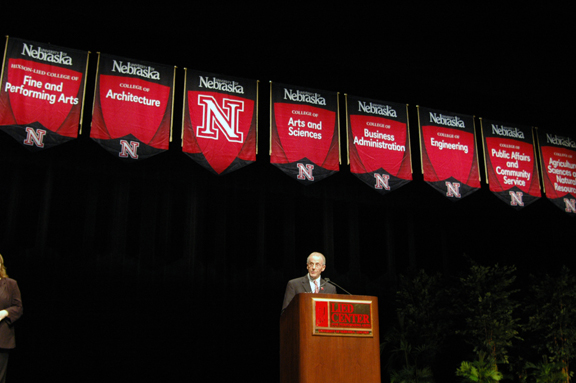
During his Sept. 9 State of the University address, Chancellor Harvey Perlman called for creativity in the face of an uncertain state budget and praised faculty and staff efforts that have kept UNL moving forward.
However, as clouds gathered outside the Lied Center for Performing Arts, Perlman compared UNL's series of budget reductions to Lingchi, a Mandarin word for an ancient form of Chinese torture where small pieces of flesh are cut from a person's body over an extended period of time. Lingchi is also the source of the phrase, "death from a thousand cuts."
"I can't help but reflect on this as I look forward to what is predicted to be in the next biennium, a requirement that we reduce our budget for the eighth time in 11 years," Perlman said. "It is true that throughout this period, we have made significant progress. However, I do not think a university can constantly 'cut its way to greatness.'
"Lingchi is not a recipe for success."
The state faces a projected budget shortfall of several hundred million dollars during the 2012-13-budget cycle. Considering that outlook, Perlman called for continued assistance and ideas from faculty and staff.
"We must continue to find creative ways to advance the mission of the university with fewer resources or generate more revenue," Perlman said. "We must explore every way of extracting dollars from peripheral or support programs to invest in our priorities."
As an example, Perlman said he has asked Mark Askren, UNL's chief information officer, to lead a task force aimed at reducing information technology costs. He also called for more cooperation between campuses in the University of Nebraska system.
"We will explore other ideas for structural and process changes, both in academic and administrative areas," Perlman said. "I will need your support and your ideas as we proceed."
As for bright spots in the new academic year, chancellor cited UNL's joining of the Big Ten Conference, continued work on Innovation Campus, and ongoing efforts in the university's three core missions - teaching, research and outreach.
Perlman also praised how far UNL has come in the last decade. Key areas of growth mentioned include enrollment (just over 22,000 in 2000, 24,600 this year); graduation rate (47 percent in 2000, now 63 percent); graduate student enrollment (3,900 in 2000, 4,600 today); and research grants ($49 million a decade ago, $139 million this past year).
"Ten years ago, the Omaha World-Herald ran its series labeling us 'mediocre,'" Perlman said. "This spring, they heralded our achievements and our progress."
Additional successes from the last year Perlman pinpointed included the founding of the Global Water for Food Institute; creation of the Engler Entrepreneurship Program; the integration of a new student information system; growth in sustainable practices universitywide; and the opening and upgrade of buildings, including the Gaughan Multicultural Center, Whittier Research Center, Keim Hall, Jorgensen Hall, the Abel-Sandoz Welcome Center and Knoll Residential Center.
Perlman called for continued efforts to increase UNL's six-year graduation rate, new investments in life science teaching lab facilities, and a "hard look" at how each department utilizes teaching.
"Our 'big bat' is that we are essential to the future and prosperity of Nebraska," he said, following a quote from Dr. Seuss. "Nothing has demonstrated this more than your work over the last decade to enhance the teaching, research and service of this university and nothing will drive our future success more than your continued effort.
"As Thomas Edison said, 'Opportunity is missed by most people because it is dressed in overalls and looks like work.'"
Perlman's entire speech and a video of the presentation are available at http://www.unl.edu/ucomm/chancllr/sua2010/.
- Troy Fedderson, University Communications
More details at: http://go.unl.edu/70i